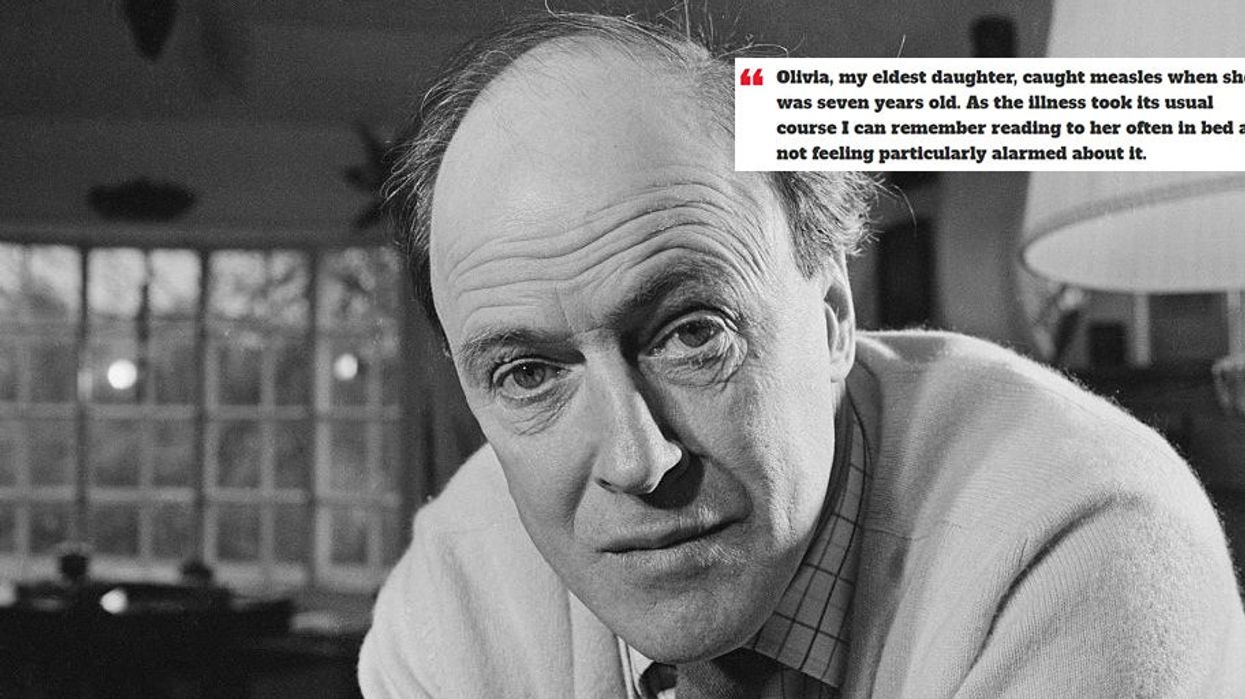Celebrities
Greg Evans
Sep 13, 2021

Picture:
Ronald Dumont/Daily Express/Getty Images
A 2019 report published by the World Health Organization listed anti-vaxxers as one of the top ten most significant threats to health on the planet.
This damming report specified how crucial vaccinations are to combating diseases like measles, which has seen a global increase of 30 per cent.
While anti-vaxxers may seem like a new trend, the concept has actually been around for decades and has encountered resistance virtually since its inception.
Roald Dahl, the author best known for his children's novels The BFG, The Witches, Matilda and Charlie and the Chocolate Factory, wrote a passionate and personal essay against anti-vaxxers.
Writing in 1986, Dahl shared a detailed and tragic account of the death of his daughter Olivia, who passed away in 1962 after contracting complications from the measles virus.
Although the medication to combat measles wasn't available in 1962, Dahl notes that upon writing the letter there had already been notable resistance to vaccinations from parents, something which continues to this day making his words even more prevalent.
The short letter was published in The Encephalitis Society Fact Sheet, but has since been made available on the Roald Dahl Fans website and remains a powerful testament to the importance of vaccinations and how ignoring their benefits can have tragic consequences.
Olivia, my eldest daughter, caught measles when she was seven years old. As the illness took its usual course I can remember reading to her often in bed and not feeling particularly alarmed about it.
Then one morning, when she was well on the road to recovery, I was sitting on her bed showing her how to fashion little animals out of coloured pipe-cleaners, and when it came to her turn to make one herself, I noticed that her fingers and her mind were not working together and she couldn’t do anything.
'Are you feeling all right?' I asked her. 'I feel all sleepy,' she said.
In an hour, she was unconscious. In twelve hours she was dead.
The measles had turned into a terrible thing called measles encephalitis and there was nothing the doctors could do to save her. That was twenty-four years ago in 1962, but even now, if a child with measles happens to develop the same deadly reaction from measles as Olivia did, there would still be nothing the doctors could do to help her.
On the other hand, there is today something that parents can do to make sure that this sort of tragedy does not happen to a child of theirs. They can insist that their child is immunised against measles. I was unable to do that for Olivia in 1962 because in those days a reliable measles vaccine had not been discovered. Today a good and safe vaccine is available to every family and all you have to do is to ask your doctor to administer it.
It is not yet generally accepted that measles can be a dangerous illness. Believe me, it is. In my opinion parents who now refuse to have their children immunised are putting the lives of those children at risk. In America, where measles immunisation is compulsory, measles like smallpox, has been virtually wiped out.
Here in Britain, because so many parents refuse, either out of obstinacy or ignorance or fear, to allow their children to be immunised, we still have a hundred thousand cases of measles every year. Out of those, more than 10,000 will suffer side effects of one kind or another. At least 10,000 will develop ear or chest infections. About 20 will die.
Every year around 20 children will die in Britain from measles. So what about the risks that your children will run from being immunised?
They are almost non-existent. Listen to this. In a district of around 300,000 people, there will be only one child every 250 years who will develop serious side effects from measles immunisation! That is about a million to one chance. I should think there would be more chance of your child choking to death on a chocolate bar than of becoming seriously ill from a measles immunisation.
So what on earth are you worrying about? It really is almost a crime to allow your child to go unimmunised. The ideal time to have it done is at 13 months, but it is never too late. All school-children who have not yet had a measles immunisation should beg their parents to arrange for them to have one as soon as possible.
Incidentally, I dedicated two of my books to Olivia, the first was ‘James and the Giant Peach’. That was when she was still alive. The second was ‘The BFG’, dedicated to her memory after she had died from measles. You will see her name at the beginning of each of these books. And I know how happy she would be if only she could know that her death had helped to save a good deal of illness and death among other children.
Top 100
The Conversation (0)













